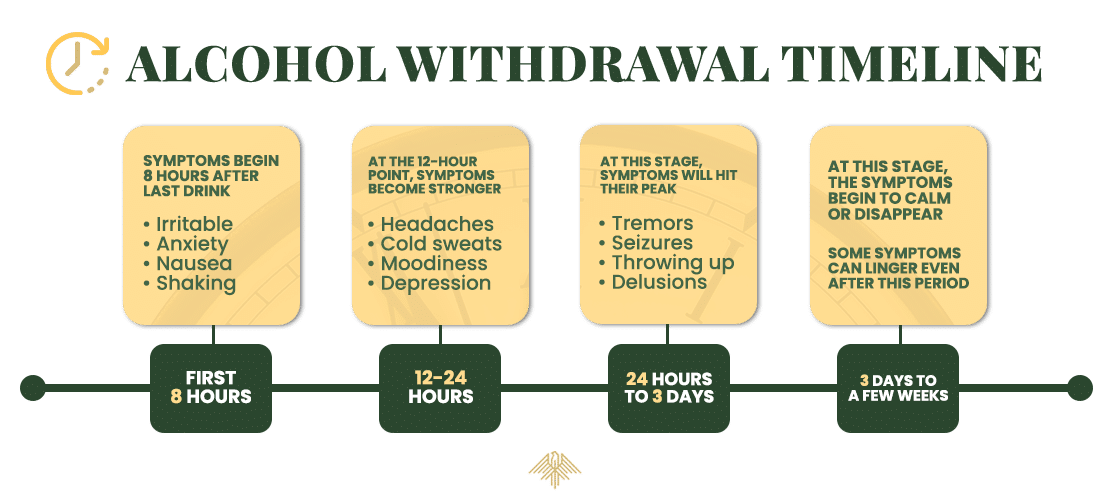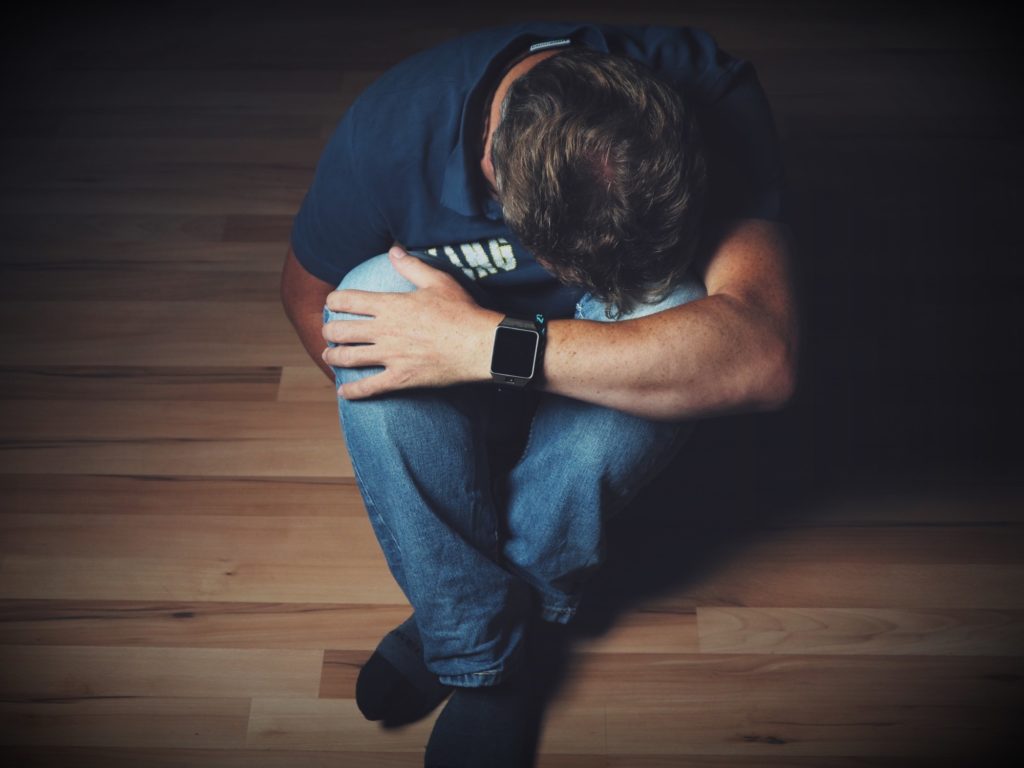Alcohol is an easily available substance that is recreationally used across the world. People include it as part of daily meals, nights out with friends and family, and celebrations. Alcohol is part of the culture and widely accepted as a common beverage of choice.
Alcohol consumption can also lead to alcohol dependence, which can lead to alcohol withdrawal. Unfortunately, most people do not realize this widely used substance can cause seriously uncomfortable symptoms that make it difficult to quit. If you ever had a hangover, you’ve experienced these symptoms firsthand.
Most people who use alcohol don’t typically experience an extreme timeline of alcohol withdrawal. However, those that have been engaging in alcohol abuse for an extended period of time may be at risk for serious symptoms that are not only uncomfortable but potentially dangerous. Alcohol withdrawal symptoms are different for everyone, and everyone’s reactions are different as well.
If you or someone you love is quitting drinking, there are some typical withdrawal symptoms you can expect during the timeline of alcohol withdrawal.
When Does Alcohol Withdrawal Begin?
Alcohol withdrawal syndrome (AWS) begins when someone suddenly stops drinking alcohol or seriously reduces their amount of consumption. AWS includes a group of symptoms that will begin to occur as the body processes the alcohol within its system with no (or very little) replacing what was previously there.
This means that the blood alcohol level has dropped below what has been previously “normal” for the person. AWS occurs in individuals that have been drinking heavily and consistently for an extended period of time. Several factors can determine the severity of AWS symptoms.
For people suffering from alcohol dependence, the symptoms of alcohol withdrawal will typically begin around the first eight hours after their last drink. In the early timeline of alcohol withdrawal, the symptoms are somewhat mild but begin to get progressively worse over time. The symptoms include:
- Irritable
- Anxiety
- Pale, sweaty skin
- Loss of appetite
- Nausea
- Shaking
Typically after 12 hours of being without alcohol people start to experience more pronounced symptoms. For individuals that were engaging in alcohol abuse in great amounts and at a great length of time, their symptoms will be much more noticeable and severe. At this point an individual may experience:
- Headaches or migraines
- Cold sweats or sweating at night
- Cognitive decline (brain fog)
- Difficulty sleeping
- Moodiness
- Throwing up
- Depression
- Nightmares or vivid dreams
- Hallucinations
This is typically the words part of the alcohol withdrawal timeline as symptoms will peak in severity. The onset can be as early as 24 hours after your last drink or take up to three full days. To prepare for this timeframe, individuals should expect to experience more uncomfortable symptoms and have resources available. This could include having a friend or family member nearby in case of an emergency or if they simply need support. Symptoms can include:
- Throwing up
- Stomach discomfort
- Tremors
- Seizures
- Delusions
- Extreme agitation
- Delirium Tremens (these will require emergency medical attention)
For most individuals going through alcohol withdrawal, the symptoms should start to calm or disappear after three days. However, many factors can alter this timeline so it’s important not to establish that as a hard and fast rule when it comes to alcohol withdrawal.
There are other symptoms like depression, anxiety, and moodiness that can last for a few weeks (or even longer). This is because alcohol depletes valuable vitamins and minerals in the brain and body and without an adequate supply of those, your emotional state can suffer.
If you or a loved one is suffering from alcohol addiction, overcoming physical dependence is only the first step. During the first few weeks after detoxing, your risk of relapse is highest, so having the plan to resist the temptation to drink will be crucial.
Factors That Impact The Alcohol Withdrawal Timeline
- Amount of alcohol consumed: the more you consume, the more likely you will experience withdrawal.
- How regularly has the person been drinking alcohol: More often you’ve been drinking the harder it will be to quit without more serious withdrawal symptoms.
- Weight: the less you weigh the quicker your blood alcohol level will rise
- Age: younger individuals typically experience withdrawals sooner if they have never had alcohol before. However, older adults should know that as they age, their body’s tolerance for alcohol lowers.
- Gender: women typically experience withdrawals sooner.
- If alcohol is combined with other drugs or medications it can enhance or worsen withdrawal symptoms.
- If the person has a comorbid or co-occurring behavioral health condition they can experience more adverse symptoms during their timeline of alcohol withdrawal.
Each person’s alcohol withdrawal timeline will differ based on these factors. If you enroll in a detox protocol to help you overcome alcohol withdrawal the medical personnel can help you better understand what to expect after your evaluation, and how to stabilize your symptoms.
How Much Alcohol Do I Have to Drink to Get Withdrawals?
It’s difficult to predict who will experience withdrawals and who will not, as well as the severity or length of symptoms. However, if someone qualifies for any of the above factors they will likely not only experience withdrawals but more severe symptoms.
What Happens to the Body and Brain During Alcohol Withdrawal?
During the timeline of alcohol withdrawal, the chemicals in your brain are becoming unbalanced. Alcohol is classified as a depressant, so if you’ve been abusing alcohol for an extended time your brain has been overproducing chemicals to create balance. When you stop drinking, your brain is still overproducing those chemicals which ultimately leads to alcohol withdrawal symptoms.
Is Quitting Drinking Suddenly Dangerous?
Most people who try to quit drinking alcohol cold turkey find that the timeline of alcohol withdrawal symptoms is extremely uncomfortable, but not typically dangerous. Symptoms can include everything from anxiety and irritability to seizures and delirium tremens (DTs).
In severe cases of alcohol abuse, however, quitting alcohol suddenly can be deadly. If you are unsure how serious your alcohol consumption may be, it’s best to speak to an addiction specialist to gain perspective. Even reaching out through an online chatbot can help you better understand your options.
What Helps Reduce Discomfort During Alcohol Withdrawal?
Entering into a medical detox program will be your safest bet to help overcome alcohol withdrawal symptoms. A medical detox protocol is a 24/7 supervised process. Medical professionals prescribe you medications to help you manage your specific symptoms. Everyone’s experience is different during detox, so having access to a medical professional to manage your symptoms ensures your comfort.
What Can I Expect in an Alcohol Detox Program?
An alcohol detox program starts with an evaluation where medical staff will determine the severity of your current alcohol abuse and how to manage your withdrawal symptoms. As mentioned before alcohol detox is different for everyone and detox treatment specialists will create a detox protocol based on your evaluation.
Next is the process of stabilization. You’ll be provided medications to manage your symptoms and monitored to be sure that you’re comfortable and recovering. This process breaks physical alcohol dependence and clears your body of toxins.
If you or a loved one is struggling with alcohol addiction, detox is only the first step on the road to recovery. Breaking alcohol addiction will be an important next step in overcoming alcohol abuse. After you’ve completed alcohol detox the facility will prepare you to enter into a treatment program.
What is the Best Way to Overcome Alcohol Addiction?
Entering into an alcohol addiction treatment program will help you overcome your alcohol dependence. Detox is a great first step in stopping alcohol consumption, but it doesn’t address the underlying reasons for addiction. An addiction treatment program will address those issues and set you up on a path to recovery.
During treatment, you’ll attend therapy and alcohol education programs, as well as develop a relapse prevention plan. These tools can help you navigate life outside the treatment facility. They can also help you better understand yourself and what caused your alcoholism to begin.
How Can I Help A Friend or Family Member Going Through Alcohol Withdrawal?
The best thing you can do is get them to a reputable detox facility to help assist with overcoming withdrawal symptoms. This is the safest option and will help keep them from relapsing due to uncomfortable withdrawals. Medical detox ensures they have the professional support they need if any complications arise.
If detox is not an option, help keep the person comfortable and make sure their schedule is clear to stay at home. You’ll also want to make sure that they have plenty of water and healthy foods on hand. And most importantly, make sure they do not have easy access to alcohol. Otherwise, the chances of relapse are much higher.
Contact Eagle Creek Recovery Today to Learn More About Alcohol Detox
If you or someone you love is struggling with alcoholism, don’t wait to get help. Contact Eagle Creek Ranch today to learn more about our alcohol detox program. We can help you through every step of recovery, from detox to aftercare. We offer comprehensive treatment programs to help you address the underlying causes of alcohol abuse.
Eagle Creek Ranch Recovery is located in beautiful Idaho and offers a serene setting to work through addiction issues and recover with dignity. Our treatment staff is fully invested in making sure you overcome alcohol abuse and develop the skills necessary to progress forward in recovery. Contact our team today!

Clinical Director
Kendall Maloof is the clinical director at Eagle Creek Ranch Recovery. She is a licensed marriage and family therapist and has held multiple leadership roles before settling here at Eagle Creek. Kendall received her master’s degree in marriage and family therapy from the Chicago School of Professional Psychology in 2016. Her career in mental and behavioral health began in 2014 when she took up internships in both the nonprofit and for profit sectors. She interned at multiple reputable companies, such as The Living Success Center and 449 Recovery in California.
In 2019, Kendall became the clinical director of Sunsets Recovery for Woman, a dual diagnosis program in southern California. Kendall is a natural leader. She has an incredible ability to problem solve and stay calm in any situation. Kendall never fails to show up when she is needed, and her calm demeanor makes her team and clients feel at ease. Eagle Creek Ranch Recovery is proud to have Kendall as our clinical director.







